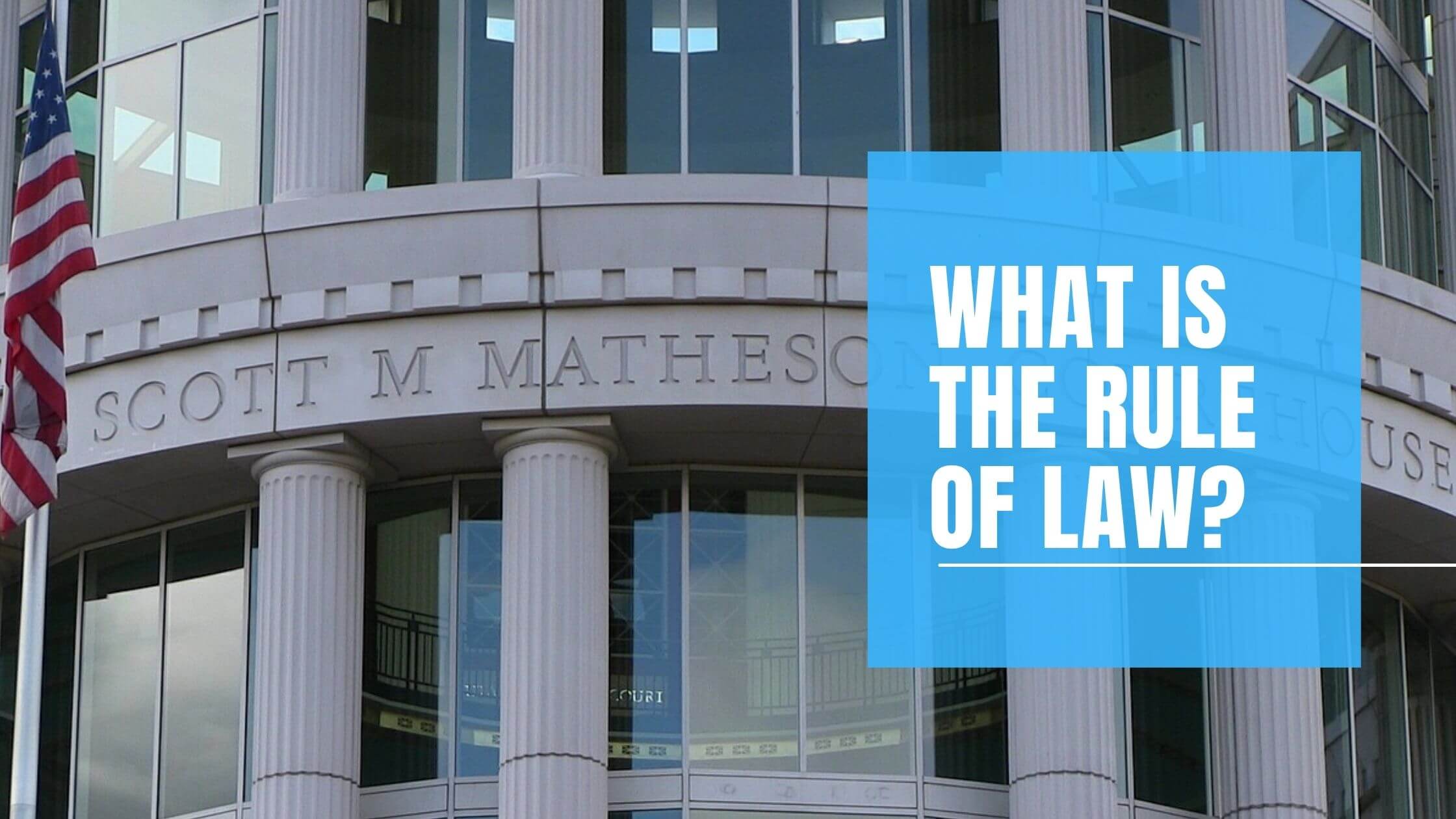Table of Contents
ToggleWhat is the “rule of law”?
Answer:
- Everyone must follow the law.
- Leaders must obey the law.
- The government must obey the law.
- No one is above the law.
Concept of the Rule of Law
The rule of law is a concept with several key tenets that help ensure a fair, civil society. Under the rule of law, laws are publicly promulgated, enforced equally, and adjudicated independently. In other words, everyone understands laws, and everyone must follow them. The law binds people in positions of power and the government in the same way as normal citizens. No one is above the law.
The United Nations definition of the rule of law includes a fourth provision that any system of law is consistent with internationally recognized human rights. This idea is often implied in United States-centric discussions on the rule of law, but it’s not always explicitly stated.
Public Promulgation
The word “promulgate” is defined as “to make widely known.” In the context of the rule of law, “publicly promulgated” laws mean that anyone can find out what the law is and understand it. These last parts are important, as a society with secret laws or laws too complicated for the public to understand isn’t one governed by the rule of law. As such, governments must ensure that laws are both simple and accessible.
Equal Enforcement
Under the rule of law, laws must be applied evenly to everyone. While there are countless examples of uneven application of laws throughout the history of the United States, the rule of law concept requires the government to do its best to treat everyone equally under the law.
The Constitution, the Bill of Rights, and policies adopted by federal and state governments have many protections for people who might otherwise suffer. These provisions include the right to a public defender if you can’t afford a lawyer, the right to a jury of your peers, and methods of removing law-breaking government officials so that they can’t use their influence in government to influence a trial.
Equal enforcement doesn’t just apply to people. Under the equal enforcement idea, the government is also subject to laws. Both private citizens and other government agencies can take legal action against government agencies when they break the law. This serves as an important check that ensures that the government follows its own rules.
Law enforcement officers, such as sheriffs, must also follow the same laws they enforce.
This ties the idea of equal enforcement directly to the constitutional text.
An Independent Judiciary
Laws aren’t always crystal clear. Even when they are, a biased government could undermine the rule of law by simply deciding cases in favor of itself. This would bypass the ‘equal enforcement’ part of the rule of law.
“Independently adjudicated” in this case means that the judges who decide what does and does not break the law must be fair and not the same as the people who write laws or the people who prosecute suspected lawbreakers. Having an impartial, independent judge helps to ensure that both sides get to make their case fairly and that there’s no bias towards one side. This ensures that laws are enforced equally and helps ensure government accountability.
The Law Is Supreme
The fundamental principle of the rule of law concept is that government serves laws, not the other way around. Under the rule of law, governmental officials seek to uphold existing legislation and pass new laws that improve the lives of citizens. They do not get to use laws to benefit themselves unfairly, punish their enemies, or help their friends. The law must be equal, impartial, understood by everyone it governs, and cases must be judged fairly.
The History of the Rule of Law
Pre-America
Many American legal practices have their roots in English court practices from before the Revolutionary War, and the rule of law is no exception. The rule of law was a major factor in signing the Magna Carta in 1215. With the Magna Carta, King John and the government of England agreed to be bound by the law.
In 1260, Henry de Bracton, an English jurist, wrote, “the king himself ought not to be under man but under God, and under the Law, because the Law makes the king.”
The idea of the Rule of Law dates back to ancient Greece. Aristotle argued that laws, not rulers, should govern society because written laws are more consistent and fair than human decisions.
The Founding Fathers drew from this idea. Their experiences under King George III, who often abused power over the 13 colonies, showed the need for a system where no one is above the law.
During the 18th century, most of the world was ruled by monarchs who claimed divine right. The United States Constitution broke from this idea by establishing that both citizens and government are equally bound by law.
Rule of Law in the Constitution
The framers of the Constitution attempted to enshrine the core ideas of the rule of law into the document. They created a separate judicial branch, added amendments to guarantee rights and ensure equality, and deliberately limited the actions the federal government could take.

Get Smarter on US News, History, and the Constitution
Join the thousands of fellow patriots who rely on our 5-minute newsletter to stay informed on the key events and trends that shaped our nation's past and continue to shape its present.
Not only were certain types of laws limited to specific houses of Congress, but the federal government was specifically limited to only the powers explicitly given to it by the Constitution.
By limiting the government, the constitution helps ensure that the government follows the law, rather than the other way around.
The rule of law forms the basic foundation of the United States Constitution. It ensures that no branch of government has unchecked power. The separation of powers – legislative, executive, and judicial – keeps each branch accountable.
Congress also has the power to approve presidential appointments, which helps maintain checks and balances.
Article II of the Constitution defines the powers of the executive branch, led by the President.
Article III establishes the Supreme Court and other federal courts, ensuring an independent judiciary.
Examples of the Rule of Law in the Constitution
The Constitution includes several mechanisms that put the Rule of Law into practice.
- Impeachment: Article I, Section 2 gives the House of Representatives the power to impeach government officials, and Article I, Section 3 allows the Senate to hold impeachment trials. This ensures that no one, including the President, is above the law.
- Trials and Rights: Article III, Section 2 guarantees the right to a trial by jury. The Fifth Amendment protects against self-incrimination and double jeopardy. The Sixth Amendment ensures a speedy, public trial.
- Search and Seizure: The Fourth Amendment
requires warrants and probable cause for searches, protecting citizens from government overreach. - Treason: Article III, Section 3 narrowly defines treason and bans the punishment of a guilty person’s family. This is another safeguard of fairness under the law.
American Law and Judicial Review
Marbury v. Madison, one of the most important decisions of the early United States Supreme Court, established that the courts could review laws and ensure that they complied with the Constitution.
The Supreme Court (see What does SCOTUS mean?) plays a key role in interpreting laws and ensuring they align with the Constitution.
The Constitution of the United States is the supreme law of the land, meaning that both the government and other laws are bound by it.
Judicial review allows an independent branch of government to ensure that no law or government agency violates this supreme law, ensuring fair and equal enforcement.
Imperfect Execution
While the rule of law is an honorable ideal, the United States government has not always followed the concept. The practice of slavery was legal until the ratification of the 13th Amendment in 1865.
In 1856, the Supreme Court’s decision in Dred Scott v. Sandford upheld this practice, claiming that black Americans had “no rights which the white man was bound to respect.” This decision violates the modern rule of law concept.
Plessy v. Ferguson and Korematsu v. United States, two other landmark cases concerning segregation, were also decided in ways that run contrary to the legal principles of the rule of law.
More modern Supreme Court justices have made statements about these decisions, saying that the original verdicts were wrong. Nevertheless, we must remain vigilant as a society and work diligently to keep mistakes like these from happening again.
In modern times, debates about government secrecy and surveillance often raise new questions about how well the rule of law is being upheld.
The rule of law protects citizens from abuse of power. It gives everyone, including lawmakers, equal protection. When citizens understand and defend this idea, they help keep the nation free and fair.
Governments aren’t perfect, and when unjust decisions are reached, we must work within the rule of law to negate those decisions via legal methods.
The rule of law ensures that everyone, from citizens to leaders, is accountable. It limits power, protects individual rights, and forms the foundation of American democracy. This principle is why the Constitution continues to protect our freedom.











